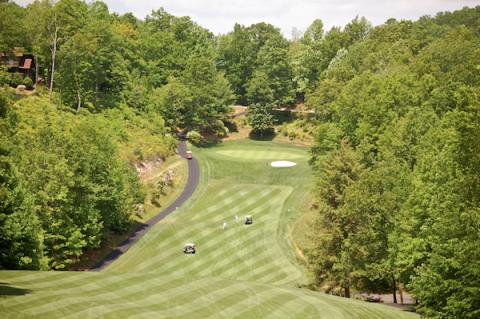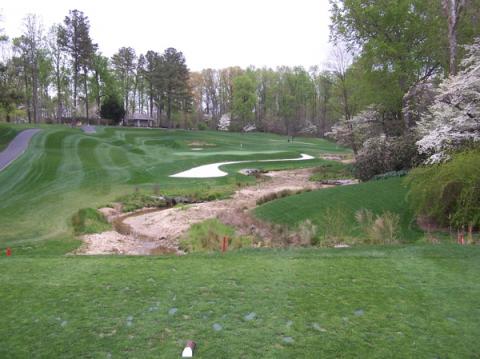
One privately owned home at Connestee Falls in the mountains of North Carolina was reduced recently by more than $500,000.
The most expensive golf communities in the southern U.S. have reached a "Morton's Fork" in pricing their unsold inventories of properties. They can reduce prices and alienate their existing property owners whose values will instantly erode; or they can ride out the storm and conserve cash yet risk alienating those same homeowners who counted on a certain roster of amenities within a certain time period. We know that some developers, like Land Resource and Ginn Resorts, have not been able to finesse their way through this dilemma. Others may follow, so we advise caution and the use of a qualified real estate agent to help you separate the wheat from the chaff. (Contact me if you would like a suggestion.)
Developers: Difficult choices
The term Morton's Fork is derived from the chancellor under King Henry VII of England, Cardinal Morton, who developed a rationale to extract taxes from the wealthy no matter their lifestyle. If the merchants spent money obviously, he reasoned that they had sufficient income to spare for the king.
Developers who have only partially sold their inventory of properties face being hoisted onto Morton's Fork. This was obvious to me over the last few days as I corresponded with one of our readers who had conserved cash before the financial crisis with an eye toward buying a piece of property in a luxe, partially developed golf community near Asheville. The golf course, one of the best in the Carolinas, is built and in full operation, as are the other promised amenities, but an inventory of developer lots remains. Our reader, who is working with a real estate agent, has his eye on a re-sale lot and is headed to the Asheville area this weekend to make an offer of 50% off the listed price; his real estate agent thinks he has a shot at scoring the bargain price, he says. (I don't want to jinx it or signal his strategy by naming the community.)
Deep price cuts by homeowners
My real estate contacts in the southeast report that other desperate private sellers are taking desperate measures, cutting prices tens of thousands of dollars. Just this morning, C.B. Johnson in Wilmington, NC, sent me a listing for a French Country Victorian home on the Intra-coastal Waterway now priced at $899,000, down from an original
Elaine VonCannon in Williamsburg, VA, reports that a home listed at $1.2 million was reduced recently to just below $1 million, but more indicative may be the recent "short sale" in Ford's Colony, a $566,000 listing that sold at $399,000. (Note: In a short sale, a homeowner who owes more on a house than he can sell it for gets the bank's permission to sell it for less than he owes, turns over the proceeds to the bank and then negotiates some reasonable payment to make up at least some of the difference.) Elaine says she is seeing more and more such short sales in local golf communities such as Kingsmill, Stonehouse and Brickshire. All my agent contacts report at least one or two foreclosures in the local golf communities as well.
Reduced prices, reduced reputation
These desperate property owners strapped for cash are selling at huge discounts, making the developers' lots seem overpriced by comparison. A developer can drop prices to match, but that immediately reduces the value of properties in the rest of the community, causing a downward spiral
Yet if the developer decides to hold the line on prices, he must offer impressive financial incentives (closing costs, liberal financing terms), expensive extra custom features, or a waiver of membership fees in the golf club (which then alienates members who paid tens of thousands of dollars). Every dollar the developers spend to provide incentives to purchase a property at "full retail" is money they cannot spend on new amenities or the maintenance of facilities, including the golf course.
Cash is king
The big winners in all this chaos are buyers with cash and bargain-hunters' mindsets. They can almost name their own prices. But be wary if you find yourself in this happy group, and make sure you have a professional along for the ride, someone who knows the developers as well as the developments. The biggest potential bargains are in the communities with the largest inventories of unsold properties, but those can also be the riskiest if the developers do not have deep enough pockets to survive the next couple of years. I advise those looking for a vacation or retirement home to include mature, fully built communities in the mix, those in which the developers have moved on and the operations have been turned over to the homeowners. Association and club dues may be a little higher than at developer-subsidized communities, but the track record is more obvious. Examples of such well-tended communities include The Landings on Skidaway Island near Savannah, Champion Hills in Hendersonville, NC, and Governor's Club in Chapel Hill, NC, all of which I have visited. These communities and others that are completed face their own thorny challenges in the current environment, but their re-sale markets are less complicated and easier to negotiate -- in more ways than one -- than partially built communities, even if the bargains are not as obvious.
Time to fork it over?
In summary, developers in this current environment are confronted with Morton's Fork. But buyers with cash have tremendous leverage and might do well to observe something we will call Berra's Fork. As the great philosopher Yogi Berra once said: "When you come to a fork in the road, take it."
 Real estate agents in the south are starting to see more "short sales" in established golf communities like Williamsburg, VA's Kingsmill Resort, and a few foreclosures as well.
Real estate agents in the south are starting to see more "short sales" in established golf communities like Williamsburg, VA's Kingsmill Resort, and a few foreclosures as well.



